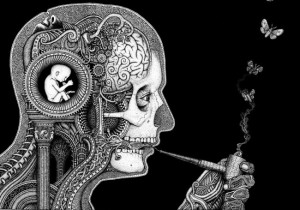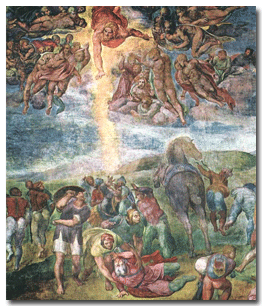 In the early part of this month, the Sun (10/3-7) and then Venus (10/8-11) set off the Uranus-Pluto square. For a good week and a half, we get to assess how we’ve been handling the definitive transit of our era.(1)
In the early part of this month, the Sun (10/3-7) and then Venus (10/8-11) set off the Uranus-Pluto square. For a good week and a half, we get to assess how we’ve been handling the definitive transit of our era.(1)
Since 2008, whenever the square has been provoked into action, there’s been an explosion, either internal or external. This is the pattern. How should we use this information? Intelligent astrophiles can do more with trigger transits than passively wait for and then react to them, or play guessing games about how they will manifest.
We can use them to ask ourselves the questions they represent, the most important questions of our lifetimes. Have we gracefully released what needed to die? Have we been flexible enough to change completely? Have we tried to understand what our souls had in mind when they incarnated into this moment in human history?
Mental Health
Against the backdrop of Uranus and Pluto’s over-arching themes, the more fleeting transits focus in on specific areas. This month one of them is Mercury Retrograde, which will try to teach us a healthier use of our minds.(2)
As a first step, we need to concede that many of our mental habits are unhealthy. Every one of us carries around old, unhappy stories about ourselves: our own private scrapbook of embarrassments. Again and again, we go back over these self-abnegating tales, despite the fact that they seem to have no purpose except to make us feel bad. Eckert Tolle calls them “pain pictures.”
When something happens to trigger one, our mental screen clicks on automatically. The pain picture animates, automatically. And we feel bad, automatically.
The defining feature of pain pictures is their familiarity. It’s like toxic relatives who we keep inviting over, because, well, they’re family. If you have a good therapist, she’s probably explained to you how pernicious pain pictures can be, and has tried to help you get a handle on them. Mental habits, like the behavioral kind, thrive on a compulsive stubbornness of the unconscious mind.
This could be the month when a breakthrough occurs.
Mercury Retrograde
Mercury is retrograde between Oct. 4th and 25th, and there’s no better transit to get out of our mental ruts. A recent article by Frederick Woodruff, a masterful skewerer of astrological clichés, offers up a refreshingly in-depth understanding of this frequently recurring transit.
between Oct. 4th and 25th, and there’s no better transit to get out of our mental ruts. A recent article by Frederick Woodruff, a masterful skewerer of astrological clichés, offers up a refreshingly in-depth understanding of this frequently recurring transit.
Factoring in the astronomical arrangement of Mercury and Earth as well as the difference between the solar and lunar mind, he describes Mercury Retrograde as a time when we can “roam the contents of memory but not drift into a cul-de-sac.” Instead of playing victim to mental habits we can unplug from them.
Like digital detox camp, where gadget addicts take a break from their electronic jones, Mercury Retrograde can leave us feeling more alive and balanced.
Spiritual Knowing
Mercury represents the faculty of reason. It’s especially reasonable when in Libra, as it is for most of this month. Our reasoning minds manage for us the ingress and egress of information in everyday life. This is a relatively prosaic use of our intelligence; it is not the same thing as spiritual knowing. But Mercury can serve as a gateway to spiritual knowing.
When we watch our own mental process, we are using Mercury to get beyond Mercury. Observing our thoughts, as in Vipassana meditation, we get a glimpse of the mind’s workings as a mechanism, as a curiosity, as a phenomenon. Instead of looking at things through thinking, we look at thinking.  This exercise raises the question, “Who’s doing the looking?” It can’t be the mind, because that’s what’s being observed. It must be something else. We are thus led to the realization that the mind is not the sum total of who we are. We are something more.
This exercise raises the question, “Who’s doing the looking?” It can’t be the mind, because that’s what’s being observed. It must be something else. We are thus led to the realization that the mind is not the sum total of who we are. We are something more.
It’s a line of inquiry that dares to challenge a sacred cow of the Enlightenment: René Descartes’ famous thesis, “I think therefore I am.” To identify with our inner observer is to see that the thinking mind is not, after all, the be-all and end-all of selfhood.
In fact, many spiritual traditions teach that true wisdom can be achieved only when we recognize our bondage to mental noise for what it is – an addiction; and apply the necessary discipline to keep it from overpowering us.
This discipline may well be easier to practice during Mercury retrograde, when our  mental patterns can be seen as just that: patterns, habits. And habits can change. Wrenched out of our usual channels, we’re more likely to achieve that rare and precious condition sought by practitioners of Zen: a moment of not-thinking.
mental patterns can be seen as just that: patterns, habits. And habits can change. Wrenched out of our usual channels, we’re more likely to achieve that rare and precious condition sought by practitioners of Zen: a moment of not-thinking.
Robin Williams
The suicide of Robin Williams in August was blamed on many things, from drugs to genetics.(3) I would suggest that some of the fault lay with Cartesian philosophy.
The man had Mercury and Pluto conjunct at the midheaven to the degree: a raw statement about the power (Pluto) of the mind (Mercury); in his case, a mind that operated in public (M.C.). It was a mind that was so fast and flexible it seemed almost preternatural. Not merely dazzling, his wit seemed to come from an alien place.
Genius and other abnormalities
People’s reactions to abnormality (e.g. geniuses, idiot savants, the severely disabled) are telling. We might feel awe-inspired, or we might be freaked-out.  What’s unsettling is that these conditions defy easy explanation. They seem to be driven by forces that neither science nor conventional personality theory can explain.
What’s unsettling is that these conditions defy easy explanation. They seem to be driven by forces that neither science nor conventional personality theory can explain.
When an outer planet is merged with a personal planet, as Williams’ Mercury was, the way it gets expressed is often pathologized by traditional psychology (as in, It isn’t covered by our theories, so it must be bad). We humans tend to distrust, at best, whatever is extremely unfamiliar.(5)
This is not to say that outer-planet aspects are not sometimes destructive. Definitely, they can go that way. Pluto conjunctions especially are notorious for prompting self-harm or sociopathic behavior.(6)
I once saw Williams as part of a triple bill with the brilliant clowns Bill  Irwin and Geoff Hoyle. It was an unscripted show, entirely spontaneous, and what happened was alarming: Williams took over the stage and wouldn’t let it go. His co-performers were forced to stand by helplessly as RW paced manically back and forth downstage, playing off the roaring, adoring crowd. His routines were, of course, spellbindingly funny; but after a while, what he was doing up there started to feel unhealthy. He had made himself king of the spotlight and would not – or could not – share it.
Irwin and Geoff Hoyle. It was an unscripted show, entirely spontaneous, and what happened was alarming: Williams took over the stage and wouldn’t let it go. His co-performers were forced to stand by helplessly as RW paced manically back and forth downstage, playing off the roaring, adoring crowd. His routines were, of course, spellbindingly funny; but after a while, what he was doing up there started to feel unhealthy. He had made himself king of the spotlight and would not – or could not – share it.
I think the key distinction here is between would-not and could-not.
At first blush, the question seemed to be: How could this famously kind, generous man have humiliated his friends that way, by behaving so egotistically onstage? Only later did I realize that a better question was: What kind of an inner drive could be so strong as to overpower the guy’s immense personal empathy?
Compulsion
To understand transpersonal planet aspects, we might press into service the textbook definition of compulsion: the native can’t stop the behavior even if s/he wants to.
 Bear in mind, outer-planet aspects, like any other kind, are perfectly capable of healthfulness and balance, when used mindfully. It’s just that to do so requires consummate care. And when they fall into imbalance, they fall harder.
Bear in mind, outer-planet aspects, like any other kind, are perfectly capable of healthfulness and balance, when used mindfully. It’s just that to do so requires consummate care. And when they fall into imbalance, they fall harder.
Readers with natal outer planet aspects recognize what it feels like to be driven  by something that feels like it has overpowered the will (Mars), the ethics (Jupiter), the preferences (Venus), the sense of safety (the Moon), the common sense (Mercury) and established social norms (Saturn). Imagine what it must’ve been like to live with a mind like Williams’.
by something that feels like it has overpowered the will (Mars), the ethics (Jupiter), the preferences (Venus), the sense of safety (the Moon), the common sense (Mercury) and established social norms (Saturn). Imagine what it must’ve been like to live with a mind like Williams’.
Losing the Mind
Worse still, imagine living without it. After you’ve lived with such a mind, what would it be like to think of it gone?
When I heard that Williams had been diagnosed with early Parkinson’s, a disease that often impairs the mental function, I thought about the terror of dementia that has been so big in the news lately, as all the baby boomers grow old en masse. Many are voicing the conviction that if their minds go, that’s it. No more horrible fate can be imagined. The assumption is that to lose the linear mind is to lose the self.
We have, as a culture, become so wedded to our cognitive function that we believe we’d be nothing without it. We would effectively cease to exist. For Williams, perhaps this fear was exaggerated beyond his ability to bear it.
 Descartes’ great maxim “I think, therefore I am” arose at a time in history when independent thinking was in desperate need of being rescued from the autocratic hold of monarchy and church. At that point in time, to exalt the thinking mind was a liberation.
Descartes’ great maxim “I think, therefore I am” arose at a time in history when independent thinking was in desperate need of being rescued from the autocratic hold of monarchy and church. At that point in time, to exalt the thinking mind was a liberation.
A few centuries later, we find the pendulum has swung in the opposite direction. We are mental-noise addicts in a TMI world, who may find, to our dismay, that we cannot stop our monkey minds even if we want to, just to take a little break.
But again, to recognize the pattern is to already have begun healing it. Then we put out the intention of bringing our minds back into balance with our bodies and spirits. This month’s Mercury Retrograde would be an ideal time to start.
Notes
1 The general range of this transit is 2008-23, and its peak period is right now: 2012-15, during which time Uranus and Pluto are exactly 90 degrees apart seven times. The next exactitude is this December; the last one is in March 2015.
2 I do not mean “mental health” as the clinical psychologists means it, as a diagnostic label, but as a relative concept, based on the premise that our  mental function should support our life purpose. Transits of Mercury can reveal how our mind works with, or against, our soul work.
mental function should support our life purpose. Transits of Mercury can reveal how our mind works with, or against, our soul work.
3 It seemed incomprehensible to many of us that so wealthy, talented and universally beloved a person could have found life fatally lacking. Williams was our Richard Cory.
Richard Cory, a poem by Edwin Arlington Robinson, is a cautionary tale about the gulf between what the public sees and what it doesn’t see in the Man Who Has Everything.
4 Many of us were emotionally struck by this death to an unusual degree, and deeply motivated to find meaning in it. No lesson penetrates so deeply as one that engages the heart, as his humor did.
And his intellect. Sometimes Williams inserted a smidgeon of erudition that would’ve struck his audiences as ponderous in any other kind of delivery. As cartoonist Darrin Bell recently wrote, “[He]’d combine classy and dirty jokes, wisdom and erudition and throw them at us so fast and from so many different directions, …[like] a new dad trying to get his baby to laugh and think at the same time.”
5 For example, people whose belief systems don’t include the idea of cosmic synchronicity, when they are confronted by a “coincidence” (two or more things happening at once, whose obvious relatedness the person cannot explain) tend to attribute negative qualities to the phenomenon. It is at best “eerie” or “spooky;” at worst, the work of the Devil.
things happening at once, whose obvious relatedness the person cannot explain) tend to attribute negative qualities to the phenomenon. It is at best “eerie” or “spooky;” at worst, the work of the Devil.
6 But who knows how much of the distortion we’re seeing is the result of societal prejudice. Most of us are culturally conditioned to suspect, even demonize, these extreme states. For the ancient Greeks, by contrast, a manic genius was a spokesperson for the gods.




